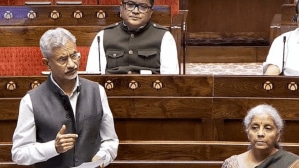Dalit men accused in 2022 Vengaivayal water tank contamination case, once blamed on upper castes
While upper caste residents in the neighbourhood welcomed the report, viewing it as a vindication of their community, Dalit leaders and activists decried it as a miscarriage of justice
 The backlash against the CB-CID chargesheet has been visible. On Saturday, Vengaivayal residents staged a sit-in protest after being barred from joining a demonstration organised by the VCK in Pudukkottai town.
The backlash against the CB-CID chargesheet has been visible. On Saturday, Vengaivayal residents staged a sit-in protest after being barred from joining a demonstration organised by the VCK in Pudukkottai town.
In a twist that has sparked outrage in Tamil Nadu, the state police’s Crime Branch-Criminal Investigation Department (CB-CID) filed a chargesheet naming three Dalit men as accused in a 2022 case connected to the finding of human excrement in the overhead water tank supplying drinking water to Scheduled Caste families in Vengaivayal village.
Local residents had blamed people from a nearby upper caste neighbourhood for the incident, but investigators now say it was the result of personal vendettas and not rooted in caste discrimination.
The chargesheet, submitted to a special court in Pudukkottai on January 20, accuses J Muraliraja, 32, B Sudharshan, 20, and K Muthukrishnan, 22 — all Dalit men from Vengaivayal — of contaminating the water to seek revenge against Muthaiya, a former panchayat president, and Padma, his wife and the incumbent president of the Mutukadu Panchayat.
According to the CB-CID, the trio acted out of resentment after Muthaiya refused to reinstate Shanmugam, a tank operator dismissed by the panchayat. According to the probe, Shanmugam was distributing water in the village and was removed from service by a resolution passed by Mutukadu panchayat president Padma. When residents approached Padma’s husband Muthaiah to reinstate Shanmugam, he did not oblige, investigators said.
The charges include defiling water, mischief, destroying evidence, and abetment under the Indian Penal Code. The Scheduled Castes and Scheduled Tribes (Prevention of Atrocities) Act was not invoked.
The charges have shocked the Dalit community in Vengaivayal, which has long borne the weight of caste-based discrimination.
The case’s trajectory has been complex from the start. In December 2022, five children from Vengaivayal fell ill after drinking water contaminated with human excrement. The incident sparked national outrage, with Dalit rights groups pointing to systemic caste oppression. Allegations of discrimination in neighbouring Eraiyur, where upper caste residents reportedly practiced segregation through a two-tumbler system and barred Dalits from temple entry, further intensified the narrative. Initial investigations suggested that the contamination was an act of caste-based atrocity, prompting calls for justice from across the state.
However, the CB-CID probe had a different finding. The chargesheet claims that Muraliraja spread false rumours about a foul odour in the water, after which he, along with Sudharshan and Muthukrishnan, climbed the tank and contaminated it. The motive, the investigators argue, stemmed from a long-standing feud between Muraliraja’s father, Jeevanantham, and Muthaiya over the maintenance of the water tank. The agency also cited evidence such as forensic analysis of photos and videos, DNA samples, and data from 196 mobile phones, 87 mobile towers and 397 witnesses.
While upper caste residents in the neighbourhood welcomed the report, viewing it as a vindication of their community, Dalit leaders and activists have decried it as a miscarriage of justice.
Thol Thirumavalavan, prominent Dalit leader and chief of the DMK ally, VCK, said the CB-CID findings were failing the entire Dalit community.
“We demanded a CB-CID probe after some Dalit youth were taken into custody during the initial probe and told to accept the crime. But even after the CB-CID probe, Dalits are being victimised in the case. I will be meeting the Chief Minister M K Stalin soon,” he said.
The backlash against the CB-CID chargesheet has been visible. On Saturday, Vengaivayal residents staged a sit-in protest after being barred from joining a demonstration organised by the VCK in Pudukkottai town.
The government deployed over 150 police personnel to enforce tight security in the village, restricting media access and movement. Despite these measures, the protest gained traction. Two VCK functionaries managed to enter the village and were subsequently arrested. Meanwhile, demonstrations near the district Collectorate led to the arrest of 20 VCK members, including district secretary Vellai Nenjan.












